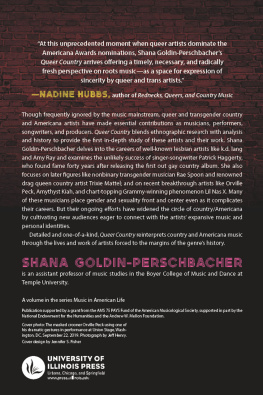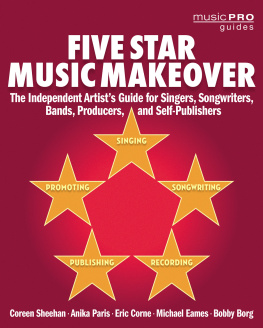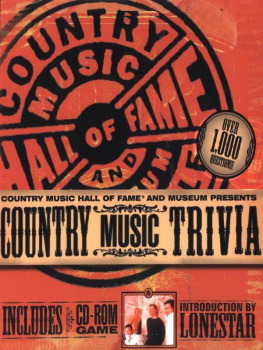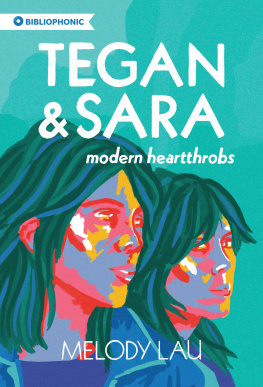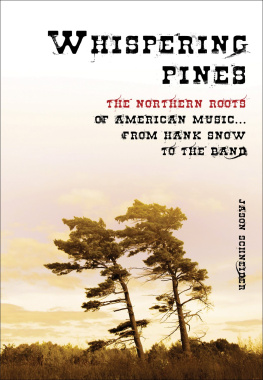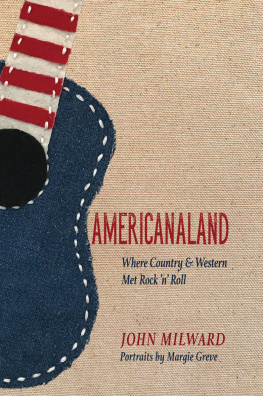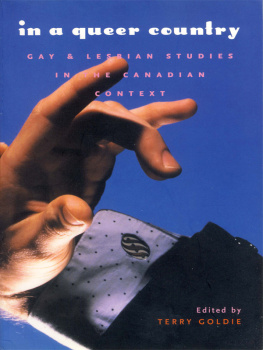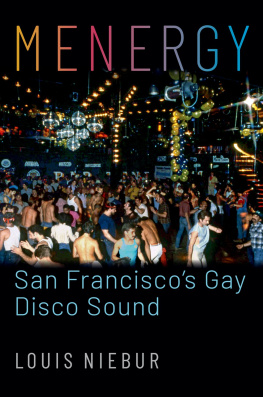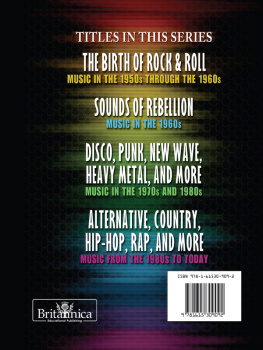Contents
Figures
Page List
Guide

queer country
Music in American Life
A list of books in the series appears at the end of this book.
queer country
shana goldin-perschbacher

Publication supported by a grant from the ams 75 pays
Fund of the American Musicological Society, supported in part by the National Endowment for the Humanities and the Andrew W. Mellon Foundation.
2022 by the Board of Trustees of the University of Illinois
All rights reserved
Library of Congress Cataloging-in-Publication Data
Names: Goldin-Perschbacher, Shana, author.
Title: Queer country / Shana Goldin-Perschbacher.
Description: Urbana: University of Illinois Press, 2022. | Series: Music in American life | Includes bibliographical references and index.
Identifiers: lccn 2021046889 (print) | lccn 2021046890 (ebook) | isbn 9780252044267 (hardback) | isbn 9780252086335 (paperback) | isbn 9780252053221 (ebook)
Subjects: lcsh: Country musicHistory and criticism. | Gender identity in music. | Gay musicians. | Transgender musicians.
Classification: lcc ml3524 .g64 2022 (print) | lcc ml3524 (ebook) | ddc 781.642dc23
lc record available at https://lccn.loc.gov/2021046889
lc ebook record available at https://lccn.loc.gov/2021046890
contents
acknowledgments
I am extraordinarily lucky to have been encouraged by my extremely generous and loving parents. They took me to concerts and suggested we go backstage to talk to the musicians I admired. In addition to helping me try a multitude of endeavors, they arranged, drove me to, paid for, and sat through lessons, rehearsals, instrument repairs, auditions, and concerts at all hours of the day and night and have been an enthusiastic audience. They have cheerfully extended this encouragement for my scholarship, attending the occasional show with me and learning in detail about the musicians, history, and concepts Im studying. My sister, Maya, has been a friend and enormous help, and her young family has provided me great joy.
When Nadine Hubbs offered Gender and Sexuality in Popular Music during my senior year of college, I was thrilled to find a way to explore social, emotional, and ideological relationships to music making. Dean helped me find my way to a graduate program at the University of Virginias Department of Music that modeled everything I wanted to be as a scholar and has continued to be an inspiration and support. The wisdom of UVAs program and thoughtful, honest, motivating mentorship from Fred Maus, Susan Fraiman, Richard Will, Michelle Kisliuk, and many others has continued to be a blessing. I hit the jackpot with the warm and generous intellectual camaraderie of my classmates and colleagues, especially Liz Lindau, Mary Simonson, Lee Bidgood, Vilde Aaslid, Allison Robbins, and Kelli Joseph, which has nurtured me and my scholarship and teaching for twenty years.
George Chauncey and Joanne Meyerowitz hired me for my first academic job as lecturer of LGBT studies at Yale University, a thrilling start for which I will always be grateful. Stanford Universitys Andrew W. Mellon Fellowship of Scholars in the Humanities, directed by the kind and wise J. P. Daughton and Lanier Anderson, encouraged my research with insightful company, introductions to scholars and publishers, reduced teaching, and funding during a recession when academic jobs were disappearing. Heather Hadlock generously created a role for me in both feminist studies and the music department, allowing me to dream up new courses, working with me to host an identity studiesthemed faculty retreat, and funding the first of many musician visits to my classrooms over the last ten years. Jesse Rodin and Daphna Davidson have offered over a decade of friendship, advice, and encouragement.
Im grateful to Robert Stroker for hiring me at Temple University, allowing me to take a sabbatical to focus on writing this book, granting me research funding, and contributing toward hosting Rae Spoon at the International Association for the Study of Popular Music (IASPM) conference. Kevin Delaney granted me summer research funding. My department contributed toward funding my conference presentations and honoraria for musicians to visit my classes. As Director of Gender, Sexuality, and Womens Studies, Heath Davis contributed generously to paying my musician guests. My department extended the extremely helpful opportunity to develop courses in American Roots Music, Queer Country, and Intersectional Identity Studies and offer them to multiple populations at Temple. My music majors, honors students, and graduate students in these courses participated in class visits and calls with several of these musicians, attended concerts and a film screening with me, and offered mature, insightful comments on portions of the book manuscript in progress. In particular Id like to thank Melissa Acheson, Elizabeth Bergman, Julius Brown, Ben Burch, Daniel Carsello, Christina Colanduoni, Marquise Cruz, Emily DeWoolfson, Rene Ray Drezner, Emiko Edwards, Zach Gallagher, Matthew Gatti, Elysia Hempel, Tom Reynolds, Bexx Rosenbloom, Ben Safran, Hannah Strong, Candace Truitt, and Vivien Wise. I have had several opportunities to share my research at Temple, including at the Center for Humanities at Temple, the Institute for Dance Studies thanks to Mark Franko and the dance department thanks to Sherril Dodds, and my own department. Responses to these lectures were enormously helpful to my thought process. A number of colleagues have offered a variety of assistance: Beth Bolton, David Cannata, Marcus DeLoach, Alex DeVaron, Rollo Dilworth, Ed Flanagan, Anne Harlow, Jan Kryzwicki, Ted Latham, Wendy Magee, Noriko Manabe, David Mindich, Steve Newman, Alisha Nypaver, Elizabeth Cassidy Parker, David Pasbrig, Devon Powers, Adam Vidiksis, Elijah Wald, Lindsay Weightman, Stephen Willier, Maurice Wright, and Asta Zelenkauskaite. Thanks in particular to Michael Klein and Steve Zohn for mentorship.
The Wolf Humanities Center at the University of Pennsylvania included me in a year-long study group organized by Heather Love and facilitated by Jim English. This working group invigorated my intellectual life at a crucial moment while I was writing, offering feedback and questions, particularly from Anne Balay, whose insight, enthusiasm, and friendship have aided me in writing this book.
Presentations at the Feminist Theory and Music Conference have prompted crucial feedback throughout my career, including in 2014, when I presented an early draft of research that would become this book. Stephan Penningtons questions and comments there were and have continued to be very helpful. I benefited from presenting portions of this book in earlier forms at the annual meeting of the American Musicological Society and also in its LGBTQ Study Group, as well as in the Queer Resource Group of the Society for Music Theory, the Society for Ethnomusicology, the Society for American Music, the US and Canadian chapters of IASPM, and the Trans* Studies Conference. Lectures at Rutgers University, the University of Virginia, Westminster Choir College of Rider University, Dickinson College, and West Chester University provided me with important outlets for developing material and answering thoughtful questions.
Chip Tucker and Jahan Ramazani extended a thrilling publishing opportunity with New Literary History to produce an essay that helped me begin writing this book. They generously offered detailed questions and editorial suggestions. I was so deeply touched and buoyed to receive the Marcia Herndon Award from the Society for Ethnomusicology for that essay. Fred Maus also invited me to publish an essay that led to crucial insights for this book.

